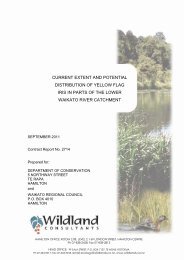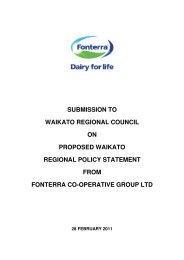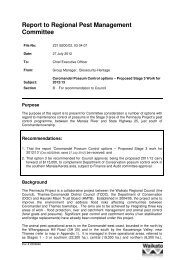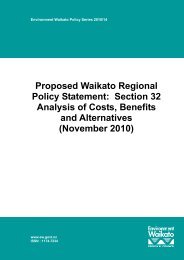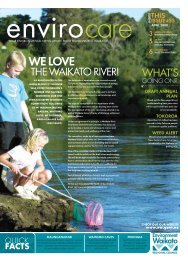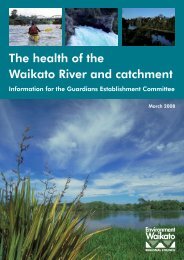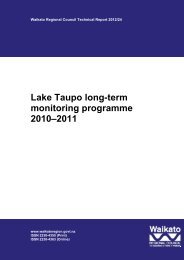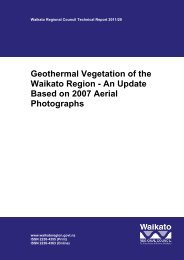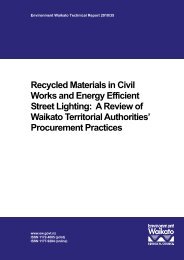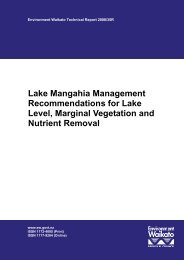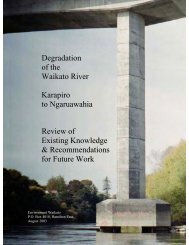Waikato regional economic profile - Waikato Regional Council
Waikato regional economic profile - Waikato Regional Council
Waikato regional economic profile - Waikato Regional Council
- No tags were found...
Create successful ePaper yourself
Turn your PDF publications into a flip-book with our unique Google optimized e-Paper software.
WRC identified three flagship goals for the current council term to focus attention onand/or change its approach to these areas of its business, so as to deliver desiredoutcomes: The values of land and water resources are sustained across the <strong>Waikato</strong>region. The people of the region collaborate to achieve a shared vision of the <strong>Waikato</strong>competing globally, caring locally. WRC meets its legislative co-governance requirements with iwi for the <strong>Waikato</strong>River by working together in good faith and a spirit of cooperation.The three flagship goals are connected and cut across social, <strong>economic</strong>, environmentaland cultural wellbeing, all groups of activities in the long term plan and functionalgroups within WRC.WRC’s mission 6 also recognises the linkages between the wellbeings of the LocalGovernment Act 2002 – particularly those between the economy and environment –and the need to ensure that actions today still enable social, <strong>economic</strong>, environmentaland cultural wellbeing to flourish for future generations. 7 WRC contributes to <strong>economic</strong>wellbeing in a number of ways through its activities:Flood protection schemes owned and maintained on the Lower <strong>Waikato</strong>, PiakoRiver and Waihou Valley in the <strong>Waikato</strong> region provide a direct protectionbenefit to 305,000 hectares of farmland. Transport planning services under the Land Transport Management Act 2003and Public Transport Management Act 2008 are important because <strong>economic</strong>wellbeing is supported by transport infrastructure such as roads, and publictransport services that reduce congestion. Regulation contributes to a secure operating environment for business andhelps achieve the allocative efficiency of natural resources, for example: the<strong>Waikato</strong> <strong>Regional</strong> Policy Statement – Geothermal Section and the <strong>Waikato</strong><strong>Regional</strong> Plan Variation 2 – Geothermal Module; and <strong>Waikato</strong> <strong>Regional</strong> PlanVariation 6, which will progressively introduce new policies and rules forallocating and using water in the region. Strategic collaboration: WRC is part of the Upper North Island StrategicAlliance, a long-term collaboration that also includes the Auckland <strong>Council</strong>, Bayof Plenty <strong>Regional</strong> <strong>Council</strong>, Northland <strong>Regional</strong> <strong>Council</strong>, Hamilton City <strong>Council</strong>,Tauranga City <strong>Council</strong> and Whangarei District <strong>Council</strong> for responding to andmanaging a range of inter-<strong>regional</strong> and inter-metropolitan issues.WRC is actively supporting the work of the <strong>Waikato</strong> Local Government Forum,which is made up of the WRC Chair and the mayors of the 11 territorialauthorities in the <strong>Waikato</strong> region. The forum is focusing on identifying thepotential for efficiencies within local government in the region. Information: WRC makes available publicly a wide range of resource andplanning information that can assist <strong>economic</strong> decision-making by firms. Thereis also demand from territorial authorities, business organisations and themedia amongst others for accurate, timely, easy-to-understand informationabout the <strong>regional</strong> economy. This <strong>profile</strong> and subsequent work will contribute tomeeting this.6“To provide <strong>regional</strong> leadership to balance <strong>economic</strong> and environmental outcomes to enable the social, <strong>economic</strong>,environmental and cultural wellbeing of current and future generations.”7The Local Government Act 2002 Amendment Bill introduced on 30 May 2012 removes reference to these linkages.Page 4 Doc #: 2069885




